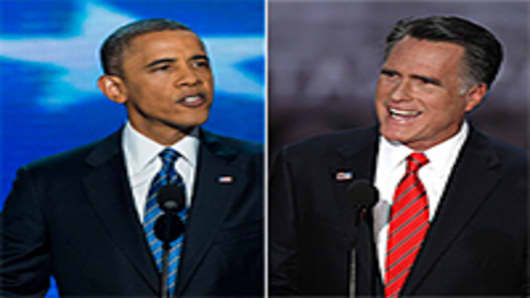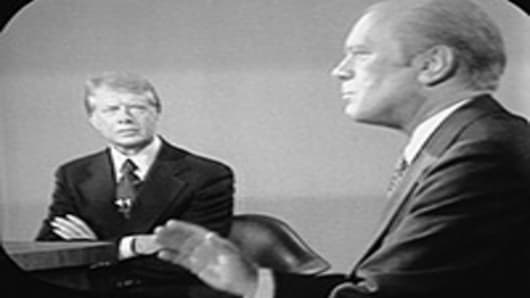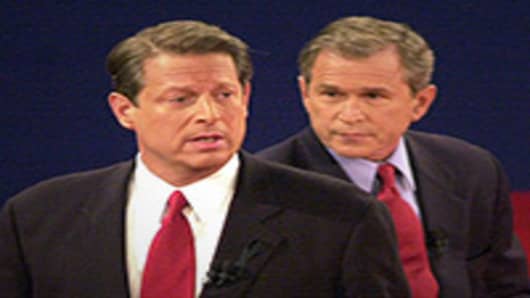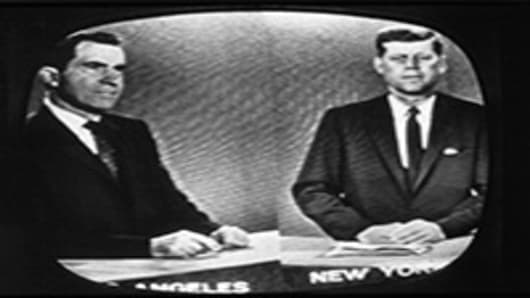With the debates between President Barack Obama and Mitt Romney starting Wednesday — and as some states have already begun early voting — there's another debate of sorts surrounding these prime-time political squareoffs: Do they really change the minds of voters?
Conventional wisdom says they do, but like the election itself, there are two sides.
"There's a lot of drama in the buildup to the debates, but the kind of drama is more like a NASCAR race," said Jeff McCall, a professor of media studies at DePauw University. "People want to see if there's a car wreck or not. The odds are that the debates won't change anyone's mind. Most are already made up."
To the contrary, said Charles Dunn, professor of government at Regent University.
"I think they're very important and can change the momentum from one candidate to the other," Dunn argued. "With the current race this close, they may be the most important event for the election."
What seems to be causing the split among experts is the reputation debates have for spotlighting a candidate's mistakes — or the smooth-as-silk comeback lines — and the impact they have on voters. (Read More:GOP Convention Fact Checking)
For example, the Kennedy-Nixon debates of 1960 are well known for JFK's suntanned coolness, and Richard Nixon's haggard, sweaty appearance. Many jaws dropped in 1976, when President Gerald Ford, in his second debate with Jimmy Carter, made the comment that Eastern Europe was not under Soviet domination. Carter's debate in 1980 with Ronald Reagan became famous for Reagan's dismissive "There you go again," leaving Carter somewhat tongue tied.
Other moments include the 1988 debate with Michael Dukakis and President George H.W. Bush, which resulted in Dukakis being remembered more for his "cold" response to a question over the imagined rape and murder of his wife and the death penalty than anything he said about economic or foreign policy.
More recently, TV cameras caught President George H.W. Bush looking at his watch debating Bill Clinton in 1992 and Al Gore's exhausting sighs during his showdown with George W. Bush in 2000. (Read More:Did Bill Clinton Get His Facts Right?)
But reported research, most notably by political scientist James Stimson, as well as studies by other observers, point out that those "gotcha" moments had little impact.
"The first George Bush may have been looking at his watch with Bill Clinton, but I think his fatal flaw was to break his 'no new taxes' pledge.""
For instance, they note that JFK's trend upward with voters was happening before the debates, and any boost he got just confirmed that trend. Ford's Eastern Europe statement apparently had little impact on voters. Some voters queried for a poll after the debate didn't mention it at all.
And Carter's loss to Reagan may have had much more to do with the bad economy and the Iranian hostage crisis than his debating skills.
"The first George Bush may have been looking at his watch with Bill Clinton, but his fatal flaw was to break his 'no new taxes' pledge," said Meena Bose, director of presidential studies center at Hofstra University. "Ultimately it's still actions, decisions and the appeal of the candidate that matters."
As for the car wreck gaffes that often come out of debates, their impact is fairly limited to water cooler talk, said Kristin Stehouwer, a political scientist and executive vice president at Northwood University.
"The sound bites are what tend to have a longer shelf life in the media than the debates themselves and could shape voters' opinions, but it's the advertising that's a major influence with voters," Stehouwer said.
Those ads, said Jerald Podair, professor of history at Lawrence University, are just part of the various ways debates have increasingly lost their impact with voters over the years.
"With cable TV and the 24 hour news cycle, the Internet and the incessant political ads, there are numerous ways to get information about the candidates without the debates," Podair said. "The debates are just not that important."
(Read More:Facebook & Election Impact)
Still, some analysts believe key moments in debates do have a major influence come Election Day.
"Many people didn't think Ronald Reagan was qualified to be president in 1980," said Lance Morgan, chief communications strategist for Powell Tate, a communications and public relations firm.
"But I don't think there's any question that his 'there you go again' and his ability to appear presidential calmed people's fears and showed he could do the job," said Morgan, who was once press secretary to Democratic Sen. Daniel Moynihan of New York.
"In my opinion there have been times when debates have had an impact," said Costas Panagopoulos, an associate professor of political science at Fordham University. "The Dukakis comment about his wife really hurt him in 1988."
Obama and Romney will face each other in three debates, starting in Denver on Wednesday followed by a town hall style forum in Hempstead, N.Y., on Oct. 16 and a final debate six days later in Boca Raton, Fla.
The two had a pre-debate debate of sorts on Sept. 23, making separate appearances on CBS's "60 Minutes," and answering questions on taxes, the economy and foreign policy—topics they're guaranteed to face again starting Wednesday.
(Read More: Obama and Romney Offer a Possible Preview of Their First Debate)
Predictions for the Romney-Obama faceoffs.
Recent polls still show a close race, but Obama has leads in key states likeOhio and Florida, and a slight advantage with most voters, while Romney suffers from the worst favorability ratings of any recent presidential candidate, according to Pew Research.
As for predictions on a debate winner, take your pick.
"President Obama has the tougher job it seems to me," said DePauw's McCall. "It will be hard to discuss current economic conditions by trying to get warm and fuzzy like in 2008. Romney just has to hold his own."
"I think Obama will clearly win because he is in a position to leverage his advantage of being a superior orator," argued Bruce Newman, professor of marketing at DePaul University. "He has a command of facts that will help him talk circles around Romney."
And for gaffes of the "car wreck" type or memorable one liners, those may be few and far between, said Regent University's Dunn, who has worked in several GOP governmental posts.
"In the short run the "47 percent" dust up puts President Obama on offense and Governor Romney on defense, which at the moment could benefit the president in the debates," said Dunn. "But both men are reserved and not likely to make an oral miscue. They are articulate in their own ways. I think there'll be less chance for either of them to make a mistake."
At least one analyst says forget the top ticket contest — and that the vice presidential debate on Oct. 11 in Danville, Ky., between Joe Biden and Paul Ryan will have more impact come November.
"Since the polling is pretty much at a dead heat, the presidential debates might not move people, where the VP debate might," contends James Peterson of Lehigh University. "Undecided and independents will wonder about the liabilities of Biden and the factual misstatements of Ryan."
In the end, said Christopher Whitt, an assistant professor of political science at Augustana College, what Americans want out of the debates is for their guy to come out on top, no matter how he, or she, gets there.
"Americans love competition and they love a winner," Whitt explained. "It's hard for them to remain enthusiastic about someone who loses in face-to-face showdowns with their opponents no matter how staged or disconnected they may be from the job they're trying to win."







